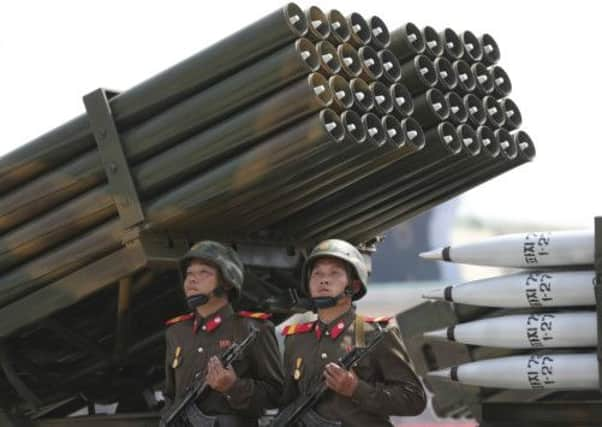Analysis: Nuclear fear keeps Korean relations cool


North Korea’s recent string of concessions, including Friday’s restoration of a cross-border military hotline, simply puts the rival Koreas closer to where they were several years ago, before North Korean attacks, atomic and missile tests, and the warnings in March and April of nuclear and missile strikes.
Despite hope that the Koreas will soon resume various languishing co-operative projects, North Korea has shown no willingness to temper a nuclear weapons drive opposed by South Korea, the United States and the United Nations.
Advertisement
Hide AdAdvertisement
Hide AdNuclear talks are the goal, but neither Washington nor Pyongyang will make compromises that could smooth the way for their resumption.
Pyongyang insists that it be recognised in any future disarmament negotiations as an undisputed nuclear power, something Washington refuses to do. Many also suspect that North Korea’s push for the so-called six-party disarmament talks after five years of inactivity is merely a gambit to trade empty nuclear promises for aid.
So while the generally mellowing atmosphere between the Koreas is far preferable to threats of war, the larger inability to settle the nuclear crisis and forge better ties between Washington and Pyongyang means that the possibility of provocations and another plunge in relations remains.
The recent optimism, albeit guarded, is a testament to the terrible state of inter-Korean relations. Whereas tangible diplomatic and security accords were once seen as the measure of a breakthrough, a simple easing of tension is now greeted as progress.
This spring’s unexpectedly intense warlike rhetoric and defiant moves by new North Korean leader Kim Jong-un may even have prompted pangs of nostalgia in Seoul for his father, the late dictator Kim Jong-il. His 17-year rule at least contained some predictability as he alternated provocations with flashes of charm intended to win aid.
Now that Pyongyang’s rhetorical firestorm has died down, that ancient pattern of brinkmanship appears to be playing out again.
The Koreas are in talks to resume operations at a jointly run factory park in the North Korean border city of Kaesong. Before Pyongyang pulled out its 53,000 workers in April, the plant brought the poor country a rare legitimate stream of foreign currency.
The countries also plan reunions later this month of families divided by the Korean War, and Pyongyang has proposed talks on restarting lucrative, jointly run tours to the North Korean resort of Diamond Mountain, called Kumgang in Korean.
Advertisement
Hide AdAdvertisement
Hide AdThese new developments can be seen as long-overdue gestures that ultimately benefit Pyongyang.
No matter how relaxed things get between the Koreas, discord still churns between Washington and Pyongyang.
Besides the moribund six-party nuclear talks, there’s last year’s US-North Korean food-for-nuclear-freeze deal, which soon collapsed after Pyongyang launched a long-range rocket seen as a cover for a banned missile test.
The North followed another rocket test in December with a February nuclear test. Subsequent UN sanctions against Pyongyang and annual US-South Korean military drills prompted the weeks-long torrent of threats from the North – and a fierce South Korean response – that has only recently eased.
Stung by last year’s diplomatic failure, Washington now sets a high bar for more nuclear talks, demanding Pyongyang first take concrete steps to demonstrate its disarmament commitment.
Those prospects are not good, and US diplomats have been less focused on seeking direct talks with the Kim government than on building consensus among the other six-party nations to increase pressure on Pyongyang.
This week, the top US envoy for North Korea policy, Glyn Davies, will be travelling to Seoul, Beijing and Tokyo to continue that effort.